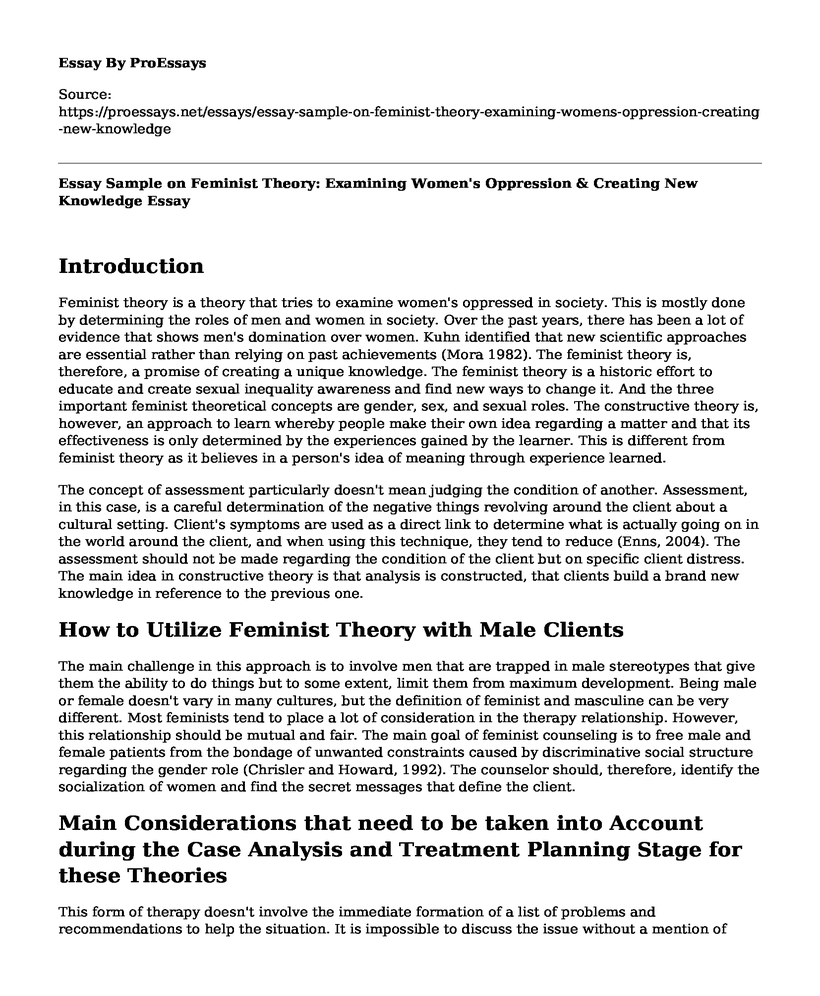Introduction
Feminist theory is a theory that tries to examine women's oppressed in society. This is mostly done by determining the roles of men and women in society. Over the past years, there has been a lot of evidence that shows men's domination over women. Kuhn identified that new scientific approaches are essential rather than relying on past achievements (Mora 1982). The feminist theory is, therefore, a promise of creating a unique knowledge. The feminist theory is a historic effort to educate and create sexual inequality awareness and find new ways to change it. And the three important feminist theoretical concepts are gender, sex, and sexual roles. The constructive theory is, however, an approach to learn whereby people make their own idea regarding a matter and that its effectiveness is only determined by the experiences gained by the learner. This is different from feminist theory as it believes in a person's idea of meaning through experience learned.
The concept of assessment particularly doesn't mean judging the condition of another. Assessment, in this case, is a careful determination of the negative things revolving around the client about a cultural setting. Client's symptoms are used as a direct link to determine what is actually going on in the world around the client, and when using this technique, they tend to reduce (Enns, 2004). The assessment should not be made regarding the condition of the client but on specific client distress. The main idea in constructive theory is that analysis is constructed, that clients build a brand new knowledge in reference to the previous one.
How to Utilize Feminist Theory with Male Clients
The main challenge in this approach is to involve men that are trapped in male stereotypes that give them the ability to do things but to some extent, limit them from maximum development. Being male or female doesn't vary in many cultures, but the definition of feminist and masculine can be very different. Most feminists tend to place a lot of consideration in the therapy relationship. However, this relationship should be mutual and fair. The main goal of feminist counseling is to free male and female patients from the bondage of unwanted constraints caused by discriminative social structure regarding the gender role (Chrisler and Howard, 1992). The counselor should, therefore, identify the socialization of women and find the secret messages that define the client.
Main Considerations that need to be taken into Account during the Case Analysis and Treatment Planning Stage for these Theories
This form of therapy doesn't involve the immediate formation of a list of problems and recommendations to help the situation. It is impossible to discuss the issue without a mention of cultural factors that mainly cause or trigger the problem. Problems should, therefore, be best being framed as situational challenges. Sometimes the therapies are forced to fill a questionnaire about the clients to assess and determine their behaviors during the therapy sessions. The feminism has changed and is currently more sensitive to oppression towards the minority or the marginalized population.
Therapeutic Strategies/Techniques Associated With Narrative and Solution-Focused Therapies
This type of therapy places focuses on the expectations of the client's future and the goals he/she plans to achieve rather than looking into his/her past. The therapist encourages the client to create and focus on developing a good view of the future. Some of the techniques used in solution-focused therapies are very friendly to the client. The therapist asks questions that help guide him from the process. For instance, coping questions, these questions determine if the client can be able to deal with the problems that he/she may encounter in the future. Another strategy is the miracle questions, which help the client create a future in which the problem is lacking. This question helps the clients to demonstrate in their own way how the absence of this problem will impact their lives.
References
Chrisler, J. C., & Howard, D. (1992). New directions in feminist psychology: Practice, theory, and research. New York: Springer Pub. Co.
Enns, C. Z. (2004). Feminist theories and feminist psychotherapies: Origins, themes, and diversity. New York: Haworth Press
Mora, G. (1982). Theory and practice of feminist literary criticism. Ypsilanti, Mic
Cite this page
Essay Sample on Feminist Theory: Examining Women's Oppression & Creating New Knowledge. (2023, Mar 20). Retrieved from https://proessays.net/essays/essay-sample-on-feminist-theory-examining-womens-oppression-creating-new-knowledge
If you are the original author of this essay and no longer wish to have it published on the ProEssays website, please click below to request its removal:
- Do Media and Social Media Shape What We Believe - Research Paper Example
- Immigration: Critical Thinking
- Sexual Abuse Towards Women of Color Paper Example
- Essay Sample on Poverty Among African Americans
- Essay Sample on Women Pioneers of Early Radio: Global Fame & Recognition
- Literary Analysis Essay on Lysistrata
- Essay Example on Black Discrimination: Persistence of Prejudice in the US







